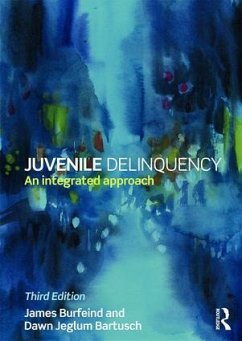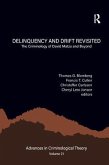This book offers a comprehensive introduction to juvenile delinquency by defining and describing juvenile delinquency, examining explanations for delinquent behavior, and considering contemporary efforts to control delinquency through prevention and juvenile justice. The text cultivates an understanding of juvenile delinquency by examining and linking key criminological theories and research. Coverage includes:
the historical origins and transformation of "juvenile delinquency" and juvenile justice;
the nature of delinquency, addressing the extent of delinquent offenses, the social correlates of offending and victimization (age, gender, race and ethnicity, and social class), and the developmental patterns of offending;
theoretical explanations of delinquency, with insights from biosocial criminology, routine activities, rational choice, social control, social learning, social structure, labeling, and critical criminologies;
evidence-based practice in delinquency prevention and contemporary juvenile justice.
Fully revised and updated, the new edition incorporates the latest theory and research in the field of juvenile delinquency and provides expanded discussion of contemporary juvenile justice reform, evidence-based practice in delinquency prevention, and disproportionate minority contact throughout the juvenile justice process. This book is essential reading for courses on juvenile delinquency and juvenile justice.
The book is supported by a range of compelling pedagogical features. Each chapter includes key terms, learning objectives, an opening case study, box inserts that provide practical application of theory and research, critical thinking questions, suggested reading, useful websites, and a glossary of key terms. A companion website offers an array of resources for students and instructors. For students, this website provides chapter overviews, flashcards of key terms,and useful websites. The instructor site is password protected and offers a complete set of PowerPoint slides and an extensive test bank for each chapter-all prepared by the authors.
the historical origins and transformation of "juvenile delinquency" and juvenile justice;
the nature of delinquency, addressing the extent of delinquent offenses, the social correlates of offending and victimization (age, gender, race and ethnicity, and social class), and the developmental patterns of offending;
theoretical explanations of delinquency, with insights from biosocial criminology, routine activities, rational choice, social control, social learning, social structure, labeling, and critical criminologies;
evidence-based practice in delinquency prevention and contemporary juvenile justice.
Fully revised and updated, the new edition incorporates the latest theory and research in the field of juvenile delinquency and provides expanded discussion of contemporary juvenile justice reform, evidence-based practice in delinquency prevention, and disproportionate minority contact throughout the juvenile justice process. This book is essential reading for courses on juvenile delinquency and juvenile justice.
The book is supported by a range of compelling pedagogical features. Each chapter includes key terms, learning objectives, an opening case study, box inserts that provide practical application of theory and research, critical thinking questions, suggested reading, useful websites, and a glossary of key terms. A companion website offers an array of resources for students and instructors. For students, this website provides chapter overviews, flashcards of key terms,and useful websites. The instructor site is password protected and offers a complete set of PowerPoint slides and an extensive test bank for each chapter-all prepared by the authors.
'Whether you are bound for a leadership career in criminal justice or you want to become a star researcher in criminology, "Juvenile Delinquency" in its third edition will make you the expert. This text is the ideal combination of organized and practical to aid mastery, but also intellectually stimulating, to make learning engaging and exciting. This edition is remarkably up to date. Chapter six taught me interesting new facts about developmental criminology!'
Terrie Moffitt, Knut Schmidt Nielsen Professor of Psychology and Neuroscience Psychiatry and Behavioral Sciences, Duke University, USA
'Burfeind and Bartusch's text provides excellent coverage of key topics and themes that are central to the study of juvenile delinquency. The book is well written, nicely organized and presents juvenile delinquency research in a clear and concise manner that is accessible to students. I have been using the book since its first edition and continue to be pleased with student learning outcomes and feedback on the book.'
Dusten Hollist, University of Montana, Missoula, USA
Terrie Moffitt, Knut Schmidt Nielsen Professor of Psychology and Neuroscience Psychiatry and Behavioral Sciences, Duke University, USA
'Burfeind and Bartusch's text provides excellent coverage of key topics and themes that are central to the study of juvenile delinquency. The book is well written, nicely organized and presents juvenile delinquency research in a clear and concise manner that is accessible to students. I have been using the book since its first edition and continue to be pleased with student learning outcomes and feedback on the book.'
Dusten Hollist, University of Montana, Missoula, USA








